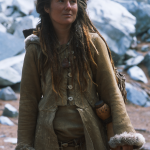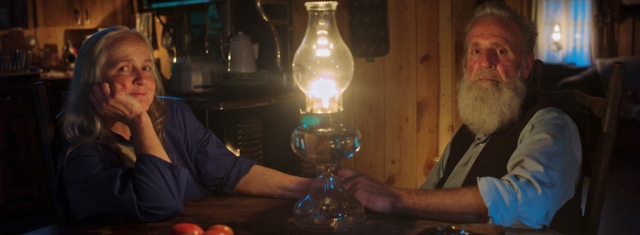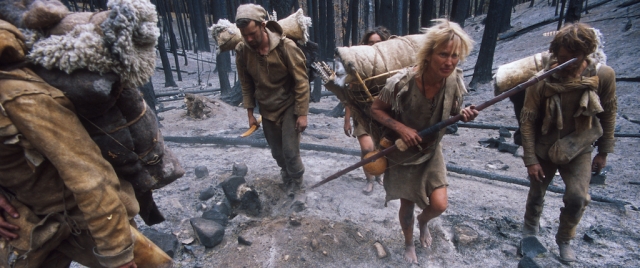Self-Sufficient and Empowered Is What We Need To Be!
The future is closing in fast, and with all the problems it brings, it is clear we are in desperate need for change. We all know we need to be more responsible for our personal, and collective actions. Self sufficiency and traditional wisdom play a huge role in how we will shape the years to come, but can we define how far we are willing to commit to this lifestyle?
Can You See Yourself Doing This?
We’re On A Slippery Slope
Topics like Permaculture and Earthships seems to have a massive effect on global consciousness. Almost everyone can relate with their results, and the problems that they solve. A simple solution we all can agree with, but what seems obvious, can soon become scary and strange for some of us.
 Recently, the internet is alive with documentation of people who went out and lived a sustainable life. These courageous individuals went out into the wilderness by themselves, or in small groups, and built a life for themselves, where few would dare to dream of. The pictures come back to us, as though from another time, begging the question, is this what your future will look like?
Recently, the internet is alive with documentation of people who went out and lived a sustainable life. These courageous individuals went out into the wilderness by themselves, or in small groups, and built a life for themselves, where few would dare to dream of. The pictures come back to us, as though from another time, begging the question, is this what your future will look like?
Although these individuals display intense examples of human determination and adaptation, they also bare the wounds of living through many hardships. These difficulties that the off-griders endured is a large bill to pay, to live a desired lifestyle. What sacrifices would you be willing to make?
There Must Be Another Way, A Happy Medium.
 We here at Valhalla, believe in helping the masses make the switch to a sustainable life. We know most people in our society will be horrified by some of these off-griders stories. We know it’s not for everyone, but certain aspects of this simple lifestyle must be appreciated and adopted if we hope to leave a better world for the generations to come.
We here at Valhalla, believe in helping the masses make the switch to a sustainable life. We know most people in our society will be horrified by some of these off-griders stories. We know it’s not for everyone, but certain aspects of this simple lifestyle must be appreciated and adopted if we hope to leave a better world for the generations to come.
There are a thousand ways to make this world more sustainable, and it is going to take each and everyone of us, to choose how we are going to help in this global endeavor. Do you want to run off and do it 100% and leave no carbon footprint? Or would you do it differently?
These choices are entirely your own.
 Being closer to family and working together with nature to provide your own food, shelter, and sustenance, is essentially what is going to save us all in the end. Everyone contributing to their community, in which ever way they see fit. The question is…..
Being closer to family and working together with nature to provide your own food, shelter, and sustenance, is essentially what is going to save us all in the end. Everyone contributing to their community, in which ever way they see fit. The question is…..
What Is The Change, You Want To Be?
Is your dream to live in the woods alone, surrounded by nature?
Perhaps you’d like to live with a few friends on an old mountain?
Or maybe you want to retrofit an old factory in the heart of a metropolis?
That is the beauty of this life, you get to decide.
Leave a comment below telling us your dream sustainable life.


In terms of my strictly personal life, I want to be able to provide myself enough food, from my own endeavours or those of the community, to be healthy and also to have a warm place to sleep. Beyond that though, I also want to be connected with wider human society and be able to make positive impacts on how we live and where we go as a species. But I also want to do all this without hurting the planet or the prospects of the species who are here.
I want to encourage drought-resistant perennials and use gardening methods that conserve water. I want to sculpt the land through what I plant, forming ecosystems that are abundant with life and that benefit the planet, because what benefits the planet benefits its inhabitants. I want to see self-expression through the arts- people getting their hands dirty and building things. I want to see communities that work together and encourage life-long learning.
I don’t think people need to be going hungry. There is so much land that goes unused. I want to see medians between roads and highways be utilized to grow useful plants- lumber, fruit trees, blueberries, herbs, and vegetables. I want to help teach people to grow food and prepare nutritious meals from what they grow. I want to see gardening programs in schools; kids could learn skills that will last them a lifetime, and they could grow produce for the cafeterias and perhaps their families, too.
I don’t want to drive a car; I’d rather walk or bike the distance I have to travel. If communities could provide more for themselves, there would be a lesser need to transport goods long distances. Transporting food across the country uses a great amount of petrol, and it isn’t helping to reduce our carbon footprint. A walk to the backyard garden proves to be physically and emotionally fruitful.
Agriculture needs to see a change. We need to know more about soil health because soil health determines the health of the plants we are trying to grow, and the health of the plants determines the health of whoever eats them. This knowledge is available, but it isn’t used in much of modern agriculture. When we see pests attack our crops, we often retaliate with pesticides. Although pesticides and herbicides provide a short-term gain, the long-term effects can cause more problems. Pests that are resistant to the chemicals found in pesticides and herbicides are the organisms that are left to reproduce. They reproduce and are then in greater numbers than before chemicals were used. This problem is perpetuated as a new chemical is formed to wipe out the resistant organisms. Earth is always changing, always adapting to what we throw at it. We should learn to work with Earth instead of against it.
Instead of applying chemicals to our land, which find their way into our water supply, we can focus on soil vitality. We can encourage the beneficial populations of soil organisms. We can give back to the soil what we take from it, so it continues to produce for generations to come. Healthy soil and sustainable planting methods protect plants against harmful pests. Harmful pests are an indication of unhealthy soil and unsustainable planting methods. The topsoil of the mid-west United States has decreased greatly since it started being farmed intensively. The mid-west grows a large portion of our nation’s corn, a crop that is not sustainable to grow on the scale which we grow it.
Our food system needs to be reworked from the bottom to the top, from the soil to the table. A healthy planet=healthy people.
Can permaculture be applied to large scale farming successfully – environmentally, socially, and economically? We have a massive population – can we apply permaculture to major farms or how do we sustainably feed ourselves? What are the models that we can apply? If you haven’t already check out the ‘Power of Community’ documentary about Cuba.
http://www.youtube.com/watch?v=L2TzvnRo6_c
Wes Jackson might be someone from whom we could learn. He established a farm in California in the 70s that is now surrounded by a city. Contract keeps this farmland from urban development. It involves community and gives back to the community in food, education, and rehabilitation.
As for your question “Can permaculture be applied to large scale farming successfully?”, I am not sure. But I know we won’t know for sure until we try it. I don’t suggest we go to every farmer and demand that he or she change his or her ways but, instead, use the land that is out of use. We can use this land to develop a working model.
There are state and national forests all over the United States. The native populations of the northeast used to find their food here, keeping forest gardens, keeping in rhythm with Earth. I suggest we utilize our forests, giving back to them what we take. Science has taught us a great deal about ecology, probably things that native populations just understood from working the land. We can use our knowledge of ecology to make better decisions- better, not best. We can always improve.
So let’s start with small steps, improving our own lives and the lives of those around us. Let’s pay it forward with food and a healthy Earth.
Thank you for suggesting the Cuba documentary. (: I’ll watch it promptly.
Let’s get our hands dirty, eh? Let’s use this blog to inspire each other and others, and share our successes and lessons learned.
I grew up in the countryside in southern germany – in an old farmhouse-building. Ironically, most of my lifetime I spent there and was not really interested in nature, gardening… now, I live in a small, ugly town in an aparment building with my wife and we dream to live more in nature. We started a VERY small garden last year but dream of live in the countryside with a BIG garden. We are both artists and very spiritual people; we dream of a simple life. In my opinion what’s worth most in life is having good friends and family and living simple. Learning skills is amazing; all the skills that mankind had for thousands of years and is now sadly more and more lost. Living according to one’s one nature (one’s SvaDharma) is also an important key.
Here’s the dream: living an amazing life while building sustainable villages and visitor centers within 2-3 hours of every major city on the planet. To define what ideal living is via examples – and each in accordance to the local eco system and cultures and dreams of the residents. To foster hundreds and then thousands and then millions of villages around the world that guarantee all our basic rights and go beyond to introduce a way of living that is in harmony with our natural environment, that is founded upon the joy of collaboration on purpose with the compassion, creativity and ingenuity of humanity, and that rests in the inner peace of connecting with the All that Is… and being one. The dream is for those of us who seek this vision to start getting our hands dirty… away from reading blogs and watching youtube videos… and more balanced with BEING this evolution we deeply seek… and doing the things that this new BEING implies while maintaining our online lives and staying connected to the people that matter to us.
Our great inspirational leaders have said the same basic things in many ways – we must be the evolution we seek – we must build the model that will render the status quo obsolete and empower us to thrive – it is time to connect the pioneers, the people, and the groups who are determined to issue in a new way of living. It’s time to bridge the gap between here and renditions of the Venus Project – renditions of the New Earth Project – and renditions of Zeitgeist.
It’s time for us to appreciate the eco villages, eco resorts, and sustainability demonstration sites that exist, and learn from their lessons to create a new, replicable model that serves humanity and the shared visions of evolutionaries around the blue green sphere we call home.
Is it possible to join a community with out giving up my life in the city. I mean i like my job, and I enjoy my daily routine and don’t want to give it up to farm the land. I work in an office so panting on the week end is fine but i am to bed at 9 and up at 5 to work by 6 and home at 6-6:30. With two hours to rest and relax, i’m not going to want to plow or plant seeds. How do i change my habits in a healthy way with out having to quit being a part of MY Society.
P.S i’m not throwing jokes, i’m seriously trying to figure out a way for me to fit in the earth ship movement. While staying were i am. and what kind of construction would build an Earthship? Since building it myself is out of the question. any input please send to [email protected]. Thank You.
I’m less interested in taking care of basic food and shelter. We’ve been ‘practicing’ this for thousands of years. I’m interested in New mind approaches… at least fractal mandala cities that allign energetically with life and earth. I want us to use technology to the utmost sustainability. I don’t want to worry about food or shelter. I’m ready to live in the garden again and I am willing to facilitate bringing forth the art form that is it’s (re)creation, its reincarnation. Welcome back gods and goddesses with veins of spirit. We’re done playing hell.